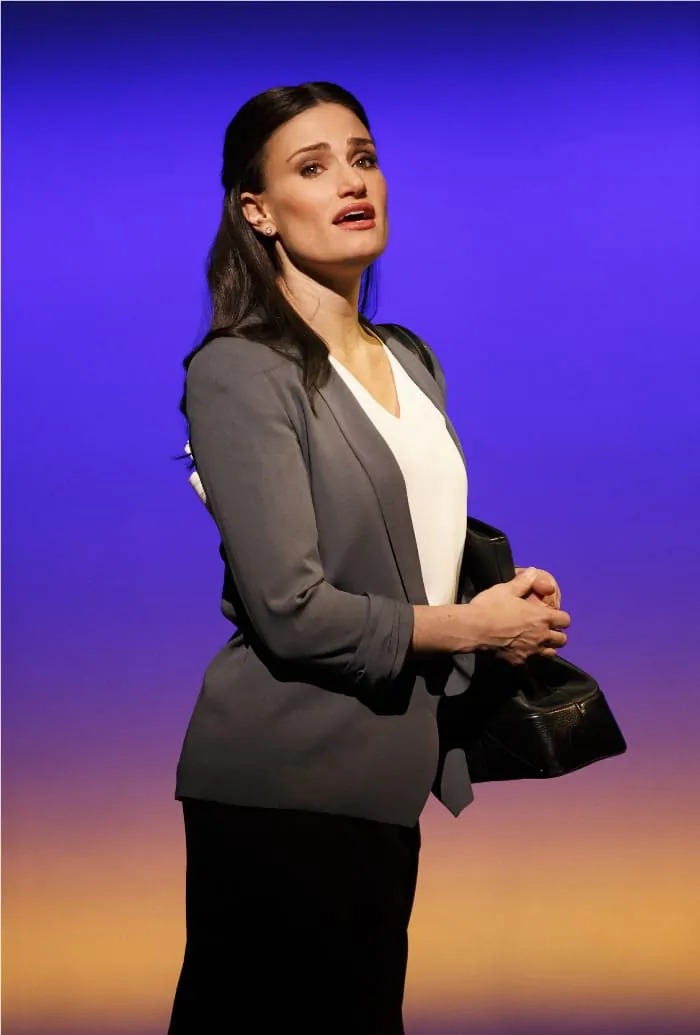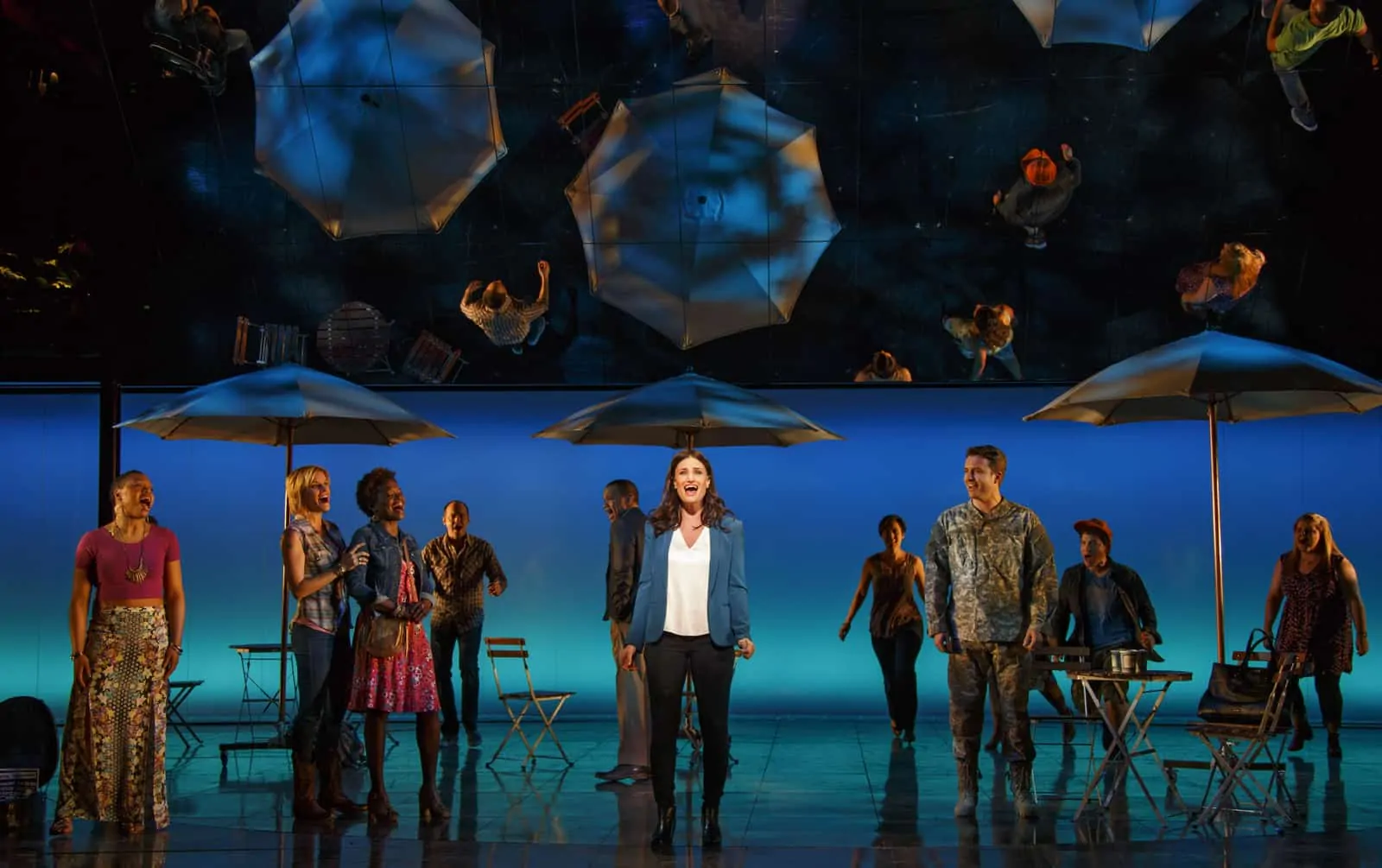Opening crowds for IF/THEN were as thick as ever outside the SHN Orpheum Theatre, despite enhanced security and backpack checks.
One might wonder why so much anticipatory buzz over a show that Peter Marx of the Washington Post likened to “a shiny new thing you’re eager to play with, but … doesn’t prove to be entirely user-friendly” and one that that Ben Brantley, in what must have been a pissy mood, dismissed, saying “The homogeneity of the numbers creates the effect of a sort of songwriting tutorial by rote.”
If something was anticipated from this show (at least by adults, as Brantley allowed that this would have a healthy audience among prepubescent girls), the next question is what it was and whether it delivered.
If you’ve ever been young, with NYC even vaguely in the periphery, there’s more than enough to embrace here.
No great brains needed for the first part of that query. Adults here (no prepubescent girls in this audience) were here to see Idina Menzel. Whether she was worth it, and whether the anticipation were fulfilled, will be temporarily set aside to talk about what worked here.
Larry Keigwin’s choreography was fascinating as much for its effect as its execution. Although individual dancers periodically command your attention, they do so almost always from the periphery. Entire dances soar, but something more interesting happens when the dancers function as a terpsichordian Greek chorus in the background, demanding attention without detracting from the story-line in progress. Superficially, the execution appears unremarkable until it hits that your brain has been stolen by the shape of the entire dance, moving on the stage like a school of fish, leaving you more aware of the geometries of the piece that power it forward.
The other pleasant surprise was how much the show was carried by James Synder as Josh, the doctor/soldier who marries a pregnant Liz. Synder’s powerfully sonorous voice more than compensates for Menzel’s. LaChanze too, sparkles, as an entirely enjoyable Kate, friend to the Liz and Beth. Anthony Rap as community activist Lucas, who represents Beth’s road not taken, remains teases from the sidelines.

Michael Greif (director), Tom Kitt (music), Brian Yorkey (book and lyrics), and Mark Wendland (set design) worked on Next to Normal. so comparisons between the shows might be helpful. The set vaguely harkened back to that of Next to Normal, which also contained a tiered platform bisecting the stage and multiple cubic areas. Here however, moving elements, including more or less cubic regions that defined the action onstage, opened and moved more fluidly, with less sense of mechanical restriction required by Next to Normal.
Menzel’s performance of favorites like “What the Fuck?” and “Map of New York” have the big sweeping feel of killer Broadway songs.
Some of the defects suggested by Brantley – in particular, the chronically upbeat ‘70’s vibe of the original Broadway production – are mitigated in this touring production, leaving behind only a fantasy ‘70’s Coca~Cola rainbow of LGBT diversity that leaves you wishing the world really was so simple, instead of gagging on its artificiality.
Act I bounces along, establishing two different life paths shaped from a single decision, one forming a character called Liz and the other, called Beth. This act had more than a fair share of moments that caught your breath and made you gasp at its clarity. If you’ve ever been young, with NYC even vaguely in the periphery, there’s more than enough to embrace here.

Unfortunately, this early momentum deflates in Act II.
While the high energy of Act I kept Liz and Beth clearly defined and separate, when energy levels dropped in Act II, roles became confused. It’s the sort of situation that Idena Menzel should be able command her way out with vocal cords alone, but it just didn’t come through consistently.
To be fair, Menzel’s performance of favorites like “What the Fuck?” and “Map of New York” have the big sweeping feel of killer Broadway songs. Even the performance “Ain’t no Man Manhattan,” performed by Anthony Rapp, James Synder, LaChanze, and Menzel will have you suspending any disbelief you might harbor about this kumbaya of hyperconnection.
However, other moments, which tended to cluster in Act II, went in the other direction. While I wouldn’t go as far as a dear friend, who claimed he didn’t understand a word that Menzel was singing, there were times The Voice delivered a high voltage laceration, devoid of warmth or resonance. Song like “You Learn to Live Without” and “Always Starting Over,” which should have been emotional focal points, came off overwrought and cringe-worthy.
Fans of Menzel, star of Wicked, Rent, and Frozen, would undoubtedly be unperturbed – and it’s entirely possible that Menzel was having an off night. So much here takes me right back to the very excellent cast album. However, the issues of Act II prevent it from being entirely satisfactory.
IF/THEN plays the Orpheum through December 6th.
Photos by Joan Marcus.


